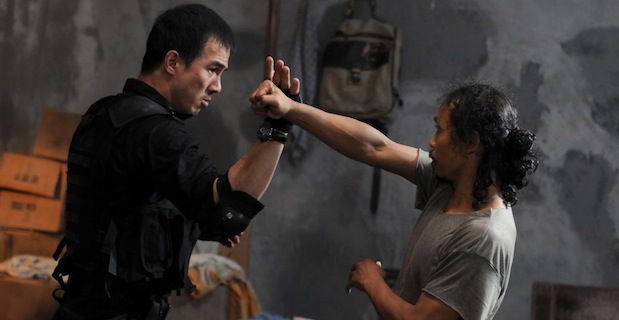
It’s unusual, at this stage of the year, to feel like 2012 has already reached its cinematic peak. No, I don’t mean The Dark Knight Rises or The Avengers – although both were pretty terrific. I’m talking about the fabulous Indonesian martial arts movie that appeared out of nowhere to take the movie world by storm earlier this year. The Raid: Redemption (or just The Raid in my neck of the woods) is, quite simply, one of the finest films to come along in years and the certainly the best action film of recent years. It’s violent, it’s messy, and it’s exhilarating. It whips along at breakneck speed and barely pauses for breath, not least due to the high stakes and claustrophobic confines of its setting. Coming from further afield, it was also spared the kind of aggressive marketing campaign that would have had some film fans tiring of it before it even arrived. Instead, it got to slither in under the radar, surprising and intoxicating viewers with the sweet embrace of a roundhouse kick to the head, and now that it’s arrived on DVD I don’t think anyone’s ever been happier.
Director Gareth Evans is a self-professed fan of old school action movies (see Hard Boiled or Police Story), and you can see that love come to bear on the simple yet glorious effectiveness of his film. In many ways, The Raid plays out like a video game, replete with actual self-contained levels and ‘boss’-like characters to overcome at every turn. The movie’s real success lies in its ability to completely immerse you in a warlike, anarchic environment where danger lurks in each shadow and impalement on a doorframe is a very distinct possibility. In keeping with this arcade-like feel, the music has a roving, electronic, magnetic flavour. Composed by Mike Shinoda of Linkin Park, it’s a methodically brilliant affair, moody and careful and brooding and punctuated by searing, shrieking flashes of distortion as the violence spills over. The atmosphere is founded on tension as Rama (Iwo Uwais) edges through the murky corridors of the tower block and the music is carefully designed to underscore this. Tracks such as “Close Shave” utilise a lingering, piercing electronic haze to perfection, echoing the shrill cries of the Joker’s theme in The Dark Knight. Others such as “The Arrival” capture the initial thrill rush as the SWAT team make their way into the bowels of the tower and begin ambushing the criminals. There’s a pulsating menace to this that bewitches the listener. It’s not often that a band of good guys are afforded such a grim sense of occasion, but this relatively brief track roots their attack in something stealthy and creeping.
“We Have Company” almost seems dazed at first, with a series of dull, throbbing notes reverberating through the corridors of the tower. It’s a tense and ominous accompaniment to the scene in which Tama reveals the presence of the police to the rest of the building and calls for them to be destroyed. In a terse reflection of the sudden magnitude and danger of the situation, the track ebbs and flows, with lengthy periods of imperilled reflection followed by brief bouts of bruising action. Yet the film is not all shrieking violence – “Rama’s Family Dream” is a more fluid, escapist track that conjures a vivid sense of what’s at stake for the young protagonist. It is also, intriguingly, one of the few tracks to use non-electronic instruments (in this case, a piano). The keys draw a sharp contrast between the lethal confines in which Rama finds himself and the family he’s fighting to get back to. Just as the glimpses of home provide the film with poignancy, so the music evokes the world of the real and emotional outside the dank sprawl of the tower.
“Drug Lab” is a soaring, almost rapturous serenade for one of the film’s standout fight scenes. However, the most harrowing – and exhausting – part of the film is the brutal face-off between Rama, his brother Andi, and Tama’s henchman Mad Dog. The latter, a storm of fists and feet, is a daunting adversary and far tougher than he looks. That it takes two to overcome him – and only after a cripplingly prolonged fight with chains and weaponry – is perfectly intimated in the triumphant string interlude that draws “Putting A Mad Dog Down” to its close. There’s a vague final minute of near-silence, as the brothers lie wasted after the fight and come to terms with the nascent bonds they’ve rediscovered in defeating him.
The Raid managed to do what no Hollywood action movie has done in years – entertain. It’s not overwrought, cynical, cheesy, or predicated on the fading appeal of an ageing star. It uses adrenaline and ceaseless energy to enthral, shock, and ravage in equal measure and provides one of the most relentlessly satisfying high-octane thrill rides of recent memory. Coupled with Shinoda’s incisive score, it’ll leave scars you may never want to heal.
(Follow Grace on twitter)
- David Fincher’s ‘Gone Girl’ Gets An Icy New Trailer - July 7, 2014
- SCENE & HEARD: ‘Jersey Boys’ - June 27, 2014
- MOVIE REVIEW: ‘Snowpiercer’ - June 21, 2014
